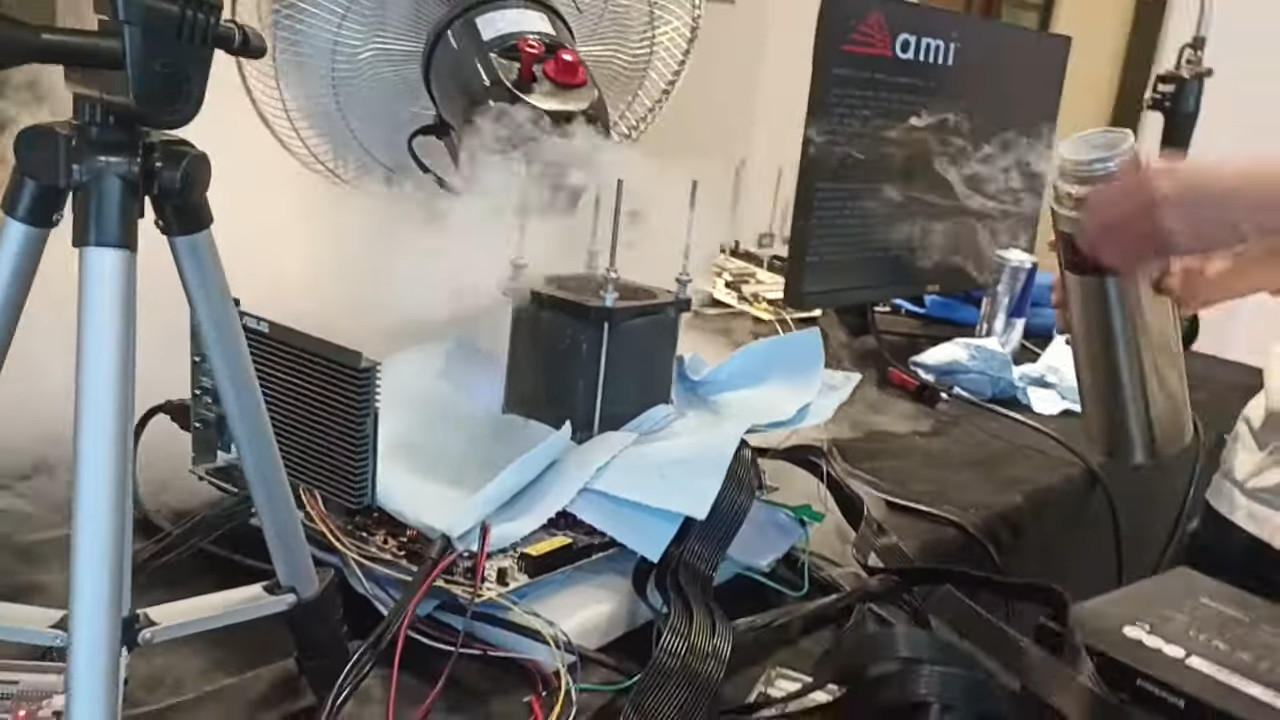
Intel’s new Arrow Lake desktop processors (Core Ultra 200S range) are just out, and inevitably that means overclockers are already pushing the flagship to its limits, which thus far has resulted in an overclock of 7.5GHz for the Core Ultra 9 285K.
This was achieved by well-known overclocker Elmor as Asus explains in a blog post, with the Core Ultra 9 CPU sitting in an Asus ROG Maximus Z890 Apex motherboard.
Elmor – and a team working on the project, comprised of 3D Systems, Diabatix, ElmorLabs, and SkatterBencher (another famous overclocker) – hit 7488.8MHz, to be precise, using liquid helium cooling. By default, the Core Ultra 9 285K boosts to 5.7GHz (clocks, and power usage, are tamer with Arrow Lake than its predecessors).
Asus also highlights that the LN2 pot – which is literally a pot, the container used for the LN or liquid nitrogen (or helium) gas to cool the CPU being ramped up to ridiculous speeds – was designed using generative AI tech from Diabatix.
So, in a small way, AI helped to provide optimum cooling here in terms of the container design, or rather the ability to explore a bunch of design alternatives in a swift manner.
Asus notes: “The output of the generative AI process was unlike anything else on the market and required the cutting-edge 3D printing tech of 3D Systems to bring to life, but the results speak for themselves.”
Running at this speed, the 285K managed to set a clutch of new world records – four of them, all in 3DMark CPU – along with 19 global first place records (and 31 first places in various benchmarks, in total). A good deal of those were different Cinebench and Geekbench results as you might imagine.
Separately, Wccftech also points out that overclocker BenchMarc managed to ramp up their DDR5 RAM to an incredible speed of 12066MT/s in the Asus ROG Maximus Z890 Apex motherboard.
Analysis: Impressive stuff – but it’s unlikely to help public perception
Arrow Lake desktop chips have had a lukewarm reception, so Intel will likely take any win it can – and the Core Ultra 9 285K does do very well when it comes to the world of extreme overclocking.
The obvious problem being that this niche view of performance is clearly not relevant to the real-world – though it is at least a hint that PC enthusiasts may get more mileage out of the 285K than others, via more traditional overclocking. (Depending on how much headroom there is to push harder with the chip, mind).
In fairness to Team Blue, Arrow Lake isn’t terrible, and certainly for app performance, the new CPUs do well enough. They do not, however, represent much of a compelling upgrade over Raptor Lake or its refresh, despite efficiency gains, and the gaming side of the equation is shoddy, frankly. (The 14900K is much stronger for gaming – and the 285K is a bit all over the place in general, with some odd benchmark results in evidence).
Those gaming oddities are possibly wrinkles that’ll be ironed out with updates from Intel, but this shouldn’t be happening with CPUs at launch (just hold them – and get it right, please, off the bat).
Still, we can’t argue with the overclocking results here, and as ever, we can expect the Core Ultra 9 285K to be pushed faster in the future, and doubtless break more heavyweight benchmarking records.







